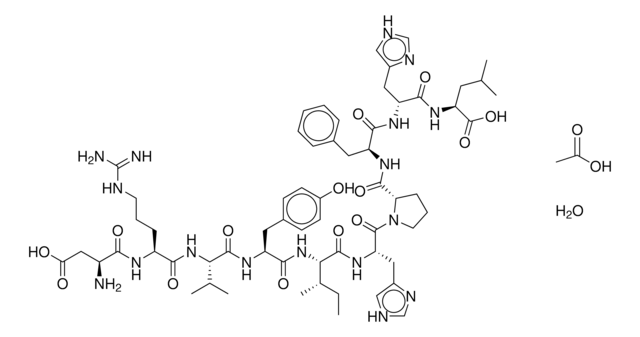About This Item
Recommended Products
Quality Level
Assay
≥97% (HPLC)
form
powder
storage temp.
−20°C
SMILES string
CC(C)[C@H](NC(=O)[C@H](CCCNC(N)=N)NC(=O)[C@@H](N)CC(N)=O)C(=O)N[C@@H](Cc1ccc(O)cc1)C(=O)N[C@@H](C(C)C)C(=O)N[C@@H](Cc2c[nH]cn2)C(=O)N3CCC[C@H]3C(=O)N[C@@H](Cc4ccccc4)C(O)=O
InChI
1S/C49H70N14O11/c1-26(2)39(61-42(67)33(12-8-18-55-49(52)53)57-41(66)32(50)23-38(51)65)45(70)58-34(20-29-14-16-31(64)17-15-29)43(68)62-40(27(3)4)46(71)59-35(22-30-24-54-25-56-30)47(72)63-19-9-13-37(63)44(69)60-36(48(73)74)21-28-10-6-5-7-11-28/h5-7,10-11,14-17,24-27,32-37,39-40,64H,8-9,12-13,18-23,50H2,1-4H3,(H2,51,65)(H,54,56)(H,57,66)(H,58,70)(H,59,71)(H,60,69)(H,61,67)(H,62,68)(H,73,74)(H4,52,53,55)/t32-,33-,34-,35-,36-,37-,39-,40-/m0/s1
InChI key
JYPVVOOBQVVUQV-CGHBYZBKSA-N
Gene Information
human ... AGTR1(185)
mouse ... AGTR1(11607)
rat ... AGTR1(24180)
Amino Acid Sequence
General description
Application
- to study the effects of ACTH, serotonin, Ang II, carbachol and elevated [K+] on catecholamine and serotonin release
- to induce cyclophilin D (CypD)–dependent mitochondrial vascular superoxide (O2. - ) production in hypertension
- to increase the homocysteine-induced ER stress-inducible, ubiquitin-like domain member 1 (HERPUD1) protein level in HeLa cells
Biochem/physiol Actions
Storage Class Code
11 - Combustible Solids
WGK
WGK 3
Flash Point(F)
Not applicable
Flash Point(C)
Not applicable
Certificates of Analysis (COA)
Search for Certificates of Analysis (COA) by entering the products Lot/Batch Number. Lot and Batch Numbers can be found on a product’s label following the words ‘Lot’ or ‘Batch’.
Already Own This Product?
Find documentation for the products that you have recently purchased in the Document Library.
Customers Also Viewed
Our team of scientists has experience in all areas of research including Life Science, Material Science, Chemical Synthesis, Chromatography, Analytical and many others.
Contact Technical Service

![[Val5]-Angiotensin II acetate salt hydrate ≥95% (HPLC), powder](/deepweb/assets/sigmaaldrich/product/structures/301/478/c093dfb8-a891-46ac-b6a1-655b77da7c03/640/c093dfb8-a891-46ac-b6a1-655b77da7c03.png)







![[Lys8]-Vasopressin ≥98% (HPLC)](/deepweb/assets/sigmaaldrich/product/structures/191/408/9eb150a0-329b-4171-a8d7-6144610b7c5c/640/9eb150a0-329b-4171-a8d7-6144610b7c5c.png)
